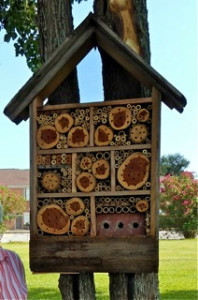
This luxury bee condo is prime real estate for native bees. Solitary bees lay their eggs in the tunnels. The habitat was built for the Summer Science Tuesdays class at Platou Center.
A beautiful Bee Condo for solitary, native bees has been mounted on two close-growing Chinaberry trees at the garden.
The condo was donated by the teaching crew for Summer Science Tuesdays at Platou Center. A second condo was installed at Platou Center. Edith Smith built the basic frame, Taylor Livingston embellished and reinforced it, Hazel Potvin and others donated the bamboo, brick, etc. to “furnish” the rooms.
Solitary, native bees will lay their eggs in the condo. Some of the 4,000 species in North America lay their eggs inside long tunnels of approximately 1/4″- 3/8″ diameter and 3-5 inches long. These bees prefer a warm nesting location, preferably facing south-southeast at about 4-5 feet above the ground.
Solitary bees do not make colonies like honey bees or bumble bees. Adults will sleep among plants or holes in the ground. They are considered non-aggressive as they do not have a hive to protect and only sting when the individual bee is threatened.
Native bees are considered the best pollinators as they can carry far more pollen on their bodies than honey bees. They carry vast amounts of pollen on their scopia and do not make honey.
Native bees include mason bees, carpenter bees, leafcutters and squash bees to name a few.




